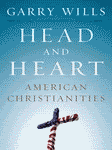|
A Review of Garry Wills' Head and Heart: American Christianities
Garry Wills is a national treasure. As I previously wrote: A Pulitzer Prize winner, perhaps no one is as prolific at writing on Church politics, Catholicism and American history with an independent mind than historian Garry Wills. He is one of a handful of writers with the necessary background (an extensive Jesuit education that included being a novitiate as well as earning PhD in classics from Yale) that allows him to authoritatively discuss subjects as diverse as Saint Augustine and Abraham Lincoln. If you're looking for a good primer that chronicles Christianity in America, here is your book.Head and Heart records how Christianity developed in America, all the way from the Puritans to the current post-Karl Rove era of politics. Perhaps most importantly, Wills provides us with valuable terminology. For example, right out the outset he explains the title within the context of the book's goal: to balance American Christianity's head (Enlightened) with its heart (Evangelical):
"Enlightened Religion," to describe the interdependence of thought and faith. He defines it as having "...its emphasis on reason, benevolence, tolerance and secular progress." And
...professes a belief in "the laws of nature and of nature's God." It holds that reason is the tool for understanding those laws, and that humane conduct is what those laws teach. He then contrasts this with "Evangelical Religion":
Evangelicals, by contrast, emphasize an experimental relationship with Jesus as their savior, along with biblical inerrancy and a mission to save others.
Doing Justice to the Founders Wills also painstakingly establishes how Jefferson and Madison were indeed after establishing a Constitutional separation of church and state. Piece by piece, he takes apart the assertion of historian Philip Hamburger who has maintained that the Founders never intended a true separation in the First Amendment." He does so by using both the Founders' own writings as well explaining their actions within, the historical context of the then-current backlash against The Great Awakening of 1730 through 1770--America's first period of Evangelical expansion.
The Transcendentalists
What is relevant to discussion of Lincoln's religion is that the Transcendentalists were at a far remove from the Evangelicals. The religion of the common man (so called) was Evangelicalism. Lincoln was a champion of the common people, so there is a wish that his religion would be theirs. But it was not. He was aware, as Doris Kearns Goodwin and others have pointed out, that he was an uncommon man with a radically original mind. He was more at home in the conceptual world of the Transcendentalists than in that of revival preachers. Yet [historian Richard] Carwardine completely ignores the Transcendentalists while trying to make improbable ties to the Evangelicals.
Addressing the Rapture But more importantly, Wills explains exactly how Rapture-based theology dovetails neatly with economic royalists who oppose economic reform (Why reform this world? All that would do is to help evil and delay the rapture). To that end, Wills gives examples of how conservative businessmen of the Gilded Age were the precursors of today's financial muscle for the Religious Right, who similarly use their wealth to finance Dispensationalists who do much to discourage both social and economic fairness.
Addressing a Post-Karl Rove World But the Bush presidency and its focus on Karl Rove's manipulation of Evangelicals is not pinnacle of this book. Instead, the future is. Throughout, Wills focuses on two conclusions: First, Evangelical religious movements never go away, but ebb and flow; and secondly, that sometimes a combination of both views of Christianity yields good results. Wills believes that just as there was and adverse reactions to the Great Awakenings, we are now entering a similar period of reaction. To this end, Wills cites environmental concerns among various Evangelicals. He then observes that sometimes when reason-based faith combines with more emotionally driven faith, positive change can come about. Wills cites abolition and the civil rights movement as his primary examples (the combination of the thought of progressive churches and the zeal of African-American evangelical churches being the winning formula). Wills is certainly pro-choice. And he makes a compelling case that outlawing abortion will not have the Religious Right's desired goal of ending artificial termination. Instead, he uses the historical context of Prohibition of how women will go underground to have the procedures done, possibly creating another lucrative business for organized crime much as outlawing the sale and transportation did after World War one. Additionally, he strongly challenges the Religious Right's theological opposition on abortion, noting that that such hostility is derived not from Scripture, but from natural law principles. The book has some shortcomings, but they are few and far in between. A thorough discussion of natural law principles and its non-theological inspiration would have strengthened several of the author's arguments, particularly concerning biological matters. It would have also been more helpful to have terms such as "latitudinarianism" and "justification" better explained (for the first half of the book a reader not schooled in theological terminology might want to have a search engine handy). But these are minor matters in an otherwise important book; required reading for those who want to better understand how we got to today's culture wars--and better yet, having a guide to recognize historical revisionism from historical fact.
A Review of Garry Wills' Head and Heart: American Christianities | 12 comments (12 topical, 0 hidden)
A Review of Garry Wills' Head and Heart: American Christianities | 12 comments (12 topical, 0 hidden)
|
||||||||||||
| ||||||||||||




 print page
print page Regular readers have no doubt noticed that I have recently been citing Garry Wills' new book,
Regular readers have no doubt noticed that I have recently been citing Garry Wills' new book,